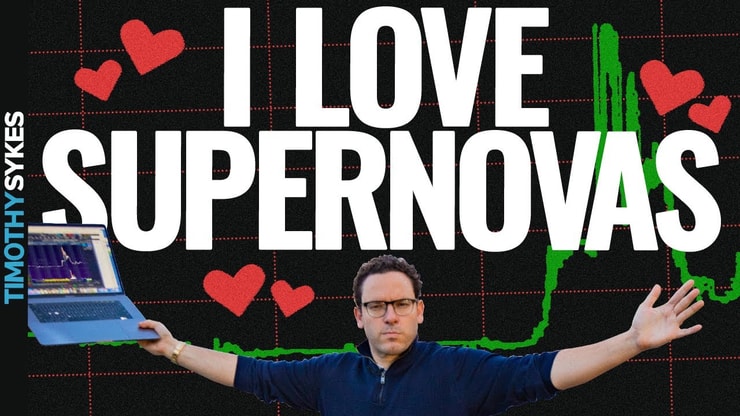Is imitation the sincerest form of flattery … or just a serious lack of original ideas on the topic of supernovas ?
I don’t care about people learning from my ideas and techniques. But when my ideas are ripped off and passed off as someone else’s, I get seriously pissed off.
It recently came to my attention that other people are using the term “Supernova” to refer to trading penny stocks. This is a term that I created over a decade ago when I first started teaching.
The problem with other people copying my terminology? They’re being dishonest, and they could be misleading you. That’s what I find unforgivable.
Make sure to read @timothysykes
Blogs and learn As Much As Possible! If you’re having troubles with fakes, this should help explain why. Also, THANK YOU for the positive mention. Moments like these bring me Insane amounts of inspiration and appreciation ♡https://t.co/TOqSRLe5AY— Tessa (@TessaLamping) October 4, 2019
Table of Contents
The Supernova: a Sykes Original
You probably already know that this is one of my all-time favorite penny stock trading patterns. It has been for a long time.
I came up with “supernova” more than a decade ago when was looking for a word to signify what happens when a penny stock price explodes upward.
I’m no scientist, but a star exploding then fading away — aka supernova — sounded about right to me.
Inspiration Versus Misuse
I don’t have a problem with other people using the term supernova.
It’s a good name, and it describes the phenomenon in the stock market. It works.
What I do have a problem with is the so-called trading gurus and half-baked financial sites co-opting the phrase and using it incorrectly.
The problem is that other people are passing it off as their original concept. That’s patently FALSE.
These people are weasels. They’re muddying the waters and they’re disrespecting me and all that I’ve worked for.
This is super annoying because everything I teach, and all of the information I offer, is based on my 20+ years trading. What I share is my original lessons, stock watchlists, and opinions, all based on my personal experience.
I’m tired of the frauds and gold diggers, and I’m calling BS on it.
It’s my duty and HONOR to teach lessons I learned the hard way over 20+ years and while I often exit too quickly, I stay safe and safe Trading is the future…or ofnore me and listen to some of these newbies and option traders who often blow up and learn the hard way too 🙂
— Timothy Sykes (@timothysykes) October 1, 2019
My focus is on building slowly over time, learning from your losses, and following a good trading plan. NOT getting rich quick.
It might not be as sexy as some of the false promises these phonies sell. But I think it’s important to acknowledge that there will be loss and lessons along the way. It’s about building a strategy — NOT getting rich quick.
Huddie acknowledges it nicely on Profit.ly:
“Focus on risk, focus on following your plan, a loss can be a good trade”
Trust Experience — Not False Promises
I’m not some suit on Wall Street.
I’m basically a trader by accident. I was on my way to becoming a tennis player, got hurt, and took up trading.
I got obsessed, and jumped into the world of trading.
What I DIDN’T do is try to climb on top of the reputations other traders built in some pitiful attempt to make a name for myself. Sure, I made mistakes … but I did it my way.
I’ve taken it one step at a time, from trading for myself to running a hedge fund to sucking at running a hedge fund to being a reality TV star to realizing how many people need to learn this stuff.
Motivation helps you get started, dedication keeps you going, but patience is CRUCIAL to achieving the most success in the long run
— Timothy Sykes (@timothysykes) October 3, 2019
I’ve used my real-life teaching style to help mentor students who have become successful in their own right.
The idea isn’t to tell my students what to do or how to get rich quick. It’s to teach them how to think for themselves rather than be followers or suckers.
Profit.ly user Kpow2020 had this to say about a recent interview with Tim Grittani, one of my top students:
“It’s great to hear other traders humble beginnings and the journeys they took to become successful. Thank you both for sharing with us.”
The Supernova is just one piece of my journey and one of the things I teach. It’s cool that it’s entered the public eye, but it’s not cool that the term is being used without context.
Fake Gurus Could Blow Up Your Account
It’s important to know what’s real and what’s not.
A lot of people claim to be millionaires. But … who are they, really?
Are they just showing you a screenshot with their account balance? Or are they showing you every single trade?
For example … say some trading guru claims to make $10K or $20K on a trade. If they started with $500K, then $10K or $20K is just a tiny percentage … and the fine print doesn’t tell you that you need a huge amount of capital to make that amount.
These traders are misleading, fake, and full of it.
They’re also using unpredictable patterns. The risk-reward patterns are bad. This means what they’re practicing and preaching could blow up their account (and yours, if you listen to them).
I know this pattern, so I try to educate my students on its variations. Education is the key to remaining nimble in the market.
Profit.ly user CrazyWillows appreciated a recent lesson about different Supernova variations:
“Thanks Tim, awesome lesson and definitely makes 100% sense what you are saying, recent supernovas over former supernovas never an exact science always a guideline.”
Not all traders are created equal. Not all strategies are created equal. There are never any guarantees in the market. Anyone who tells you that there are is either deluded or lying to you.
You’ll learn the hard way. If you get the wrong source, you shouldn’t expect to do well.
When you start learning from people who didn’t start with a small account like you, it’s a very slippery slope. Don’t expect to get rich overnight. Scale up over time.
Another green day in the market for a total profit of $400. Volume was a little better today, trying to keep losses small and only trading the best setups but still so much to improve $CPRI $SFIX $UNFI $W $X @timothysykes pic.twitter.com/rC53UE67Yv
— YoungBoss👊 (@iamjlwilliams) October 2, 2019
More Breaking News
- $30M Boost: Xinhui Solar Expands Jiuzi Holdings’ Reach in Southeast Asia
- Vale S.A. Stock Soars as Goldman Sachs Raises Price Target
- Morgan Stanley’s Bold Moves Boost Cipher Mining’s Prospects
- Skyward Surge: Momentus Inc. Soars and Faces Market Dynamics
Don’t Get Burned
Why do I say learning from newbies is so bad? They’re not bad people, they just don’t know about risk & market nuances so be careful!
— Timothy Sykes (@timothysykes) October 4, 2019
As pathetic as I think they are, I can’t stop fakes, copiers, newbies who think they know everything.
But I can warn you not to listen to them.
I’m using a strategy gained with 20 years of experience. I control risks, and I don’t make the most. But I play the stocks in a way where I’m not going to lose big. This is the basis of my Trading Challenge.
+$2.5k today! ✅ $PDSB
If you inspired at least one person to achieve more than they thought they could, your contribution to mankind already exceeds the average contribution.🥂To all the great teachers & mentors – especially the ones that inspired me @timothysykes @kroyrunner89 pic.twitter.com/kcIpuQQ0ba— Lina (@Lina_Fonfina) October 3, 2019
Profit.ly user ThePennySqueeze also sees the value in this:
“Thanks Tim. I’ve learned more from you than any other guru.”
If you’re listening to some so-called guru who doesn’t actually show you their trades, remember this:
Big rewards also have big risks. If you keep playing with fire you’re going to get burned. I like to keep it slow but steady, with $1k or $2k wins that add up over time.
Students like Profit.ly user mcrae1 keep it steady too, responding to when I posted about making $1111 trading $DCGD:
“Made a decent profit on this stock today too bought in at 1.15 sold at 1.36.”
Preparation is key, and sometimes the best play is no play or watchful waiting until the perfect setup presents itself. Don’t be greedy.
As Profit.ly user papajoenola puts it:
“I am already a slave to a job, I do not want to be a slave to the market also. Look for perfect setups”
Don’t be a sucker! Show yourself some respect and take the time to learn the rules of the market before you play.
I’m real and I like to stay safe. Whether you believe me is up to you…
Have you ever fallen into the “get-rich-quick” trap? How did that work out for you? How do you research your teachers and resources in the market today?






Leave a reply